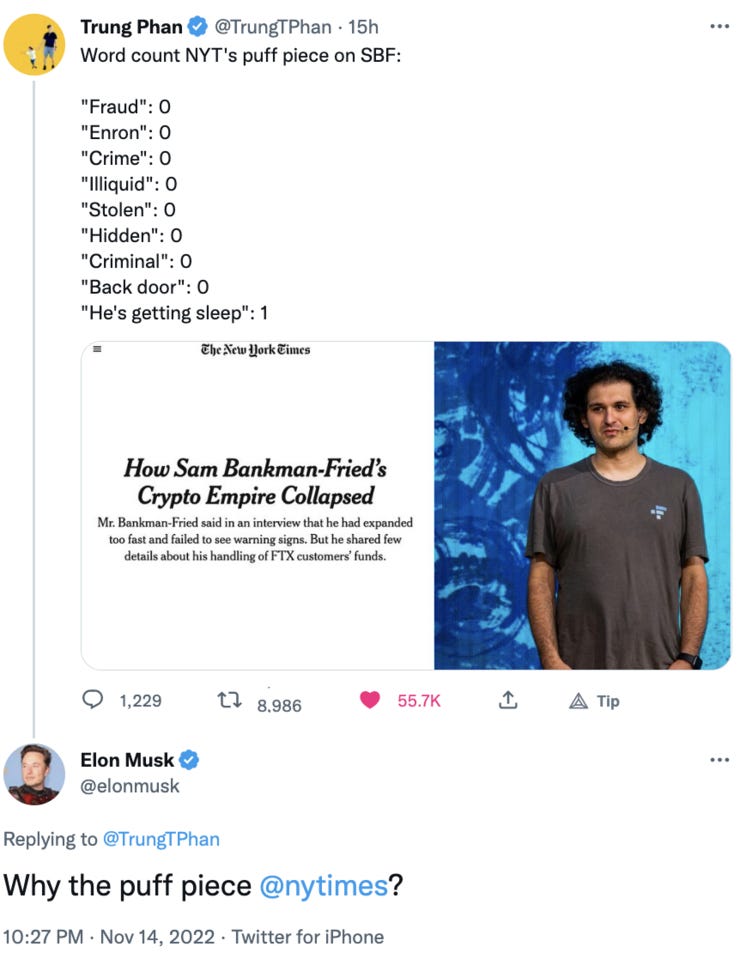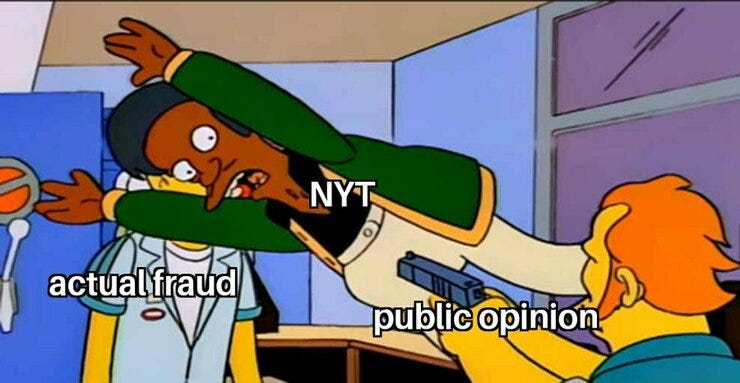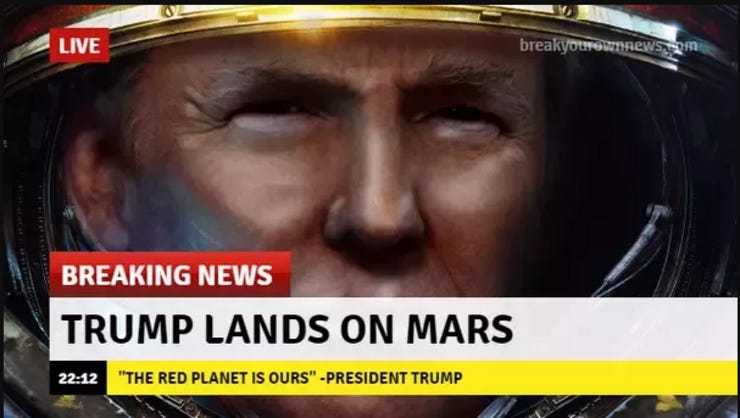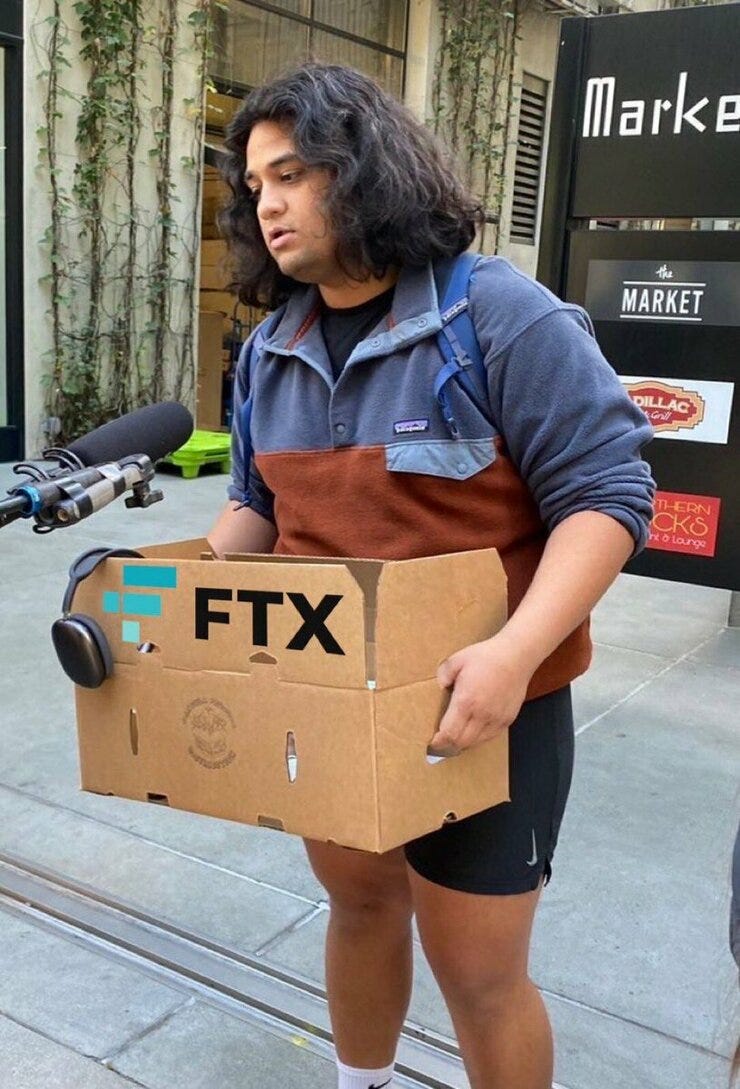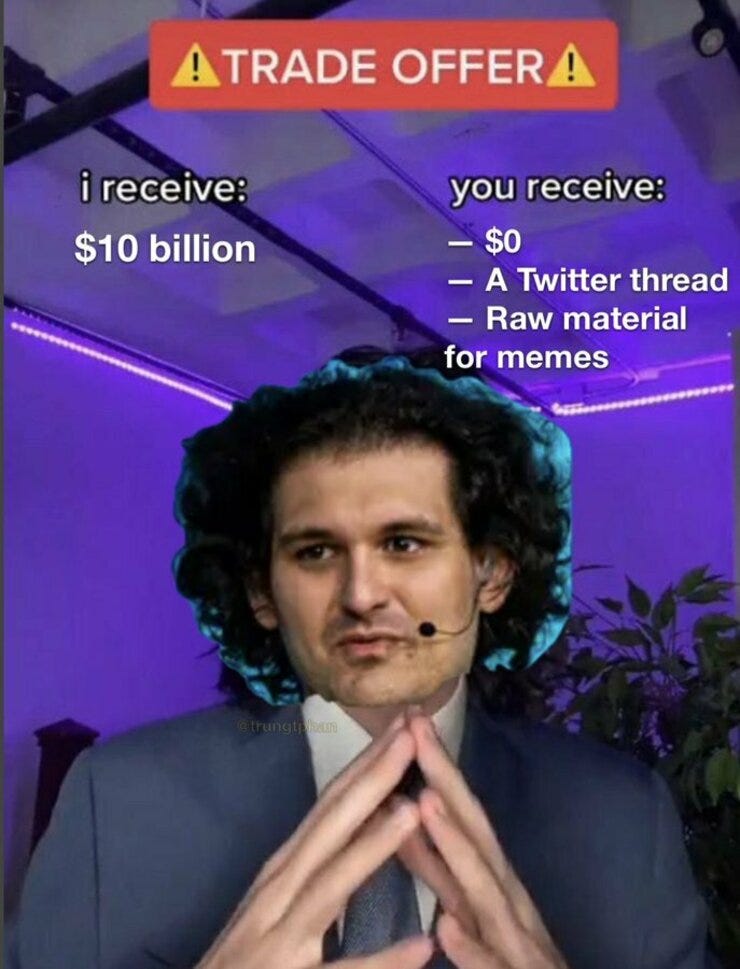This Is Why Doge Is Gonna Make It
Hey everyone,
FTX is no more, but the aftershock of its collapse is still being felt.
At this pivotal moment for the industry, banks and government are making their move into crypto turf. Dogecoin might be the people’s best weapon to fight back against Big Brother.
Let’s take a look at the battle shaping up between Dogecoin and the government’s digital dollar. We’ll also examine the media coverage of the SBF, and ask: is Twitter becoming the People’s News?
Doge Gonna Make It
Last Monday, Elon tweeted that Bitcoin "will make it," but hinted at a long winter ahead.
When a Dogecoin account asked him if he meant Doge, he responded, "That goes without saying."
The mysterious tweets raise the question of what event could be troublesome specifically for Bitcoin.
As the week progressed, a big possibility surfaced: Digital Currency Group, Barry Silbert's Wall Street crypto empire, is on the ropes.
Genesis is a crypto brokerage and subsidiary of DCG. It is in the business of crypto lending, which allows Wall Street short-sellers to influence price.
On Wednesday, Genesis suspended client withdrawals, an ominous sign for the company's solvency.
Thursday, The Wall Street Journal reported that Genesis was seeking a $1B emergency loan.
Silbert famously shorted Dogecoin on FTX, tweeting, "we've gone short DOGE via ftx.com." When he wrote "we," was he talking about DCG?
Silbert's troubles are the latest example of the Kiss of Doge: bad luck has an uncanny way of finding Dogecoin haters.
Besides Genesis, Digital Currency Group owns Grayscale Bitcoin Trust, which holds 635k Bitcoin, making it the largest such fund in the world.
There is a chance Grayscale will have to liquidate its Bitcoin to cover Genesis's obligations.
DCG also holds shares of Grayscale and will probably try to sell those first.
In the long term, Grayscale liquidation would decentralize Bitcoin ownership by removing it from the control of a single Wall Street entity. That outcome would align with Bitcoiners' values.
In the short term, however, liquidation would be bad for Bitcoin's USD price.
FTX's collapse, and the resulting industry-wide contagion, has set into motion seismic changes in the world of crypto.
After a recent G20 meeting in Indonesia, the White House posted a statement on its website by world leaders calling for international rules to regulate digital currencies.
Last week also saw the biggest of big dogs is make its move: the New York Federal Reserve announced a digital dollar pilot program in partnership with Citigroup, Mastercard, Wells Fargo, and other financial institutions.
Details are sparse at the moment, but it's massive news that the Fed is entering digital finance.
A CBDC is anathema to everything that Bitcoin stands for. While Bitcoiners prize sovereignty, decentralization, and the separation of state and money, CDBC's would give governments unprecedented control over peoples' financial lives.
The timing of the Fed and G20 announcements, at a moment when Bitcoin is struggling, is no accident. The forces of centralization are attacking while decentralized crypto is hurting.
Fortunately, while BTC is showing weakness, Dogecoin is showing strength.
More than Bitcoin, Dogecoin is a direct competitor to CBDCs: Doge is faster, cheaper, and uses less energy than BTC. Bitcoin acts like digital gold, while Doge functions as digital cash.
The stage is set for a showdown between the digital dollar and the digital dog dollar.
Stay tuned!
FTXXX
While Doge is poised to become the people's crypto, Twitter is fast becoming the people's newspaper, thanks to the events surrounding the exchange FTX.
Last week, the collapse of FTX and fall of Sam Bankman-Fried looked like it would be a cut-and-dried case of fraud.
However, it has turned into another narrative skirmish between the Internet and the corporate media.
As usual, Twitter is the primary site of populist resistance: citizen journalists are daily unearthing evidence to document SBF's fraud, while regime media is laboring to depict him as a good-hearted kid who became a victim of his own success.
The mainstream's refusal to look the story in the eye has led to all sorts of hilarious narrative contortions:
Reuters published an opinion piece claiming that SBF did the financial system a favor by emboldening regulators to go after crypto.
The Washington Post said FTX's collapse is "expected to doom the [Bankman-Fried] brothers’ pandemic-prevention agenda."
Vox argued that SBF's sizable political donations didn't impact mid-term elections. It also ran a wacky piece on a series of DMs between SBF and one of its reporters, who was also his friend.
Finally, The New York Times ran a puff piece that described SBF as sleeping well and playing video games, while omitting any mention of his crimes.
The Times's softy treatment might've had something to do with the fact that it's slated to host SBF as a speaker for an upcoming "Dealbook Summit."
Last week, SBF was still on the roster of speakers. The cost to attend the event is $2,400.
SBF was all-too-happy to trot out this same narrative in a days-long Twitter meltdown where he did everything but take responsibility for stealing people's assets.
Somehow, the story became: SBF made some mistakes but is working hard to raise money to make his customers whole.
It's hard to think of another time the press has gone so easy on a white-collar criminal. Its inability to acknowledge the fraud at the center of FTX's collapse strains its credibility as an institution on the side of the people.
Somehow, mainstream articles focused on everything—SBF's DMs with a reporter, why FTX's collapse is good for legacy banking, "Queen Caroline"—but the obvious angle: a billionaire political megadonor stole money from regular people and funneled it to sitting politicians, possibly using a warzone as a front to launder the cash.
The media's dishonesty is the latest example of what has come to be known on the Internet as the Mockingbird Media.
The term traces back to a Cold War-era CIA program called Operation Mockingbird that placed journalists in top news organizations, both in America and abroad.
As knowledge of the program has migrated from the fringe to the center of Internet discussions, the Mockingbird Media has become a powerful meme for understanding the way that news outlets seed and amplify narratives until they assume the status of truth among the general population.
In 1975, the program was disclosed to the American public through congressional investigations into CIA malfeasance known as the Church and Pike Committees.
The official story is that the program was discontinued, but, of course, speculation persists that it remains active in some form.
Folks who think it's still alive like to point to Anderson Cooper's past involvement with the CIA as circumstantial evidence.
It's not just random Internet guys who speculate about control of the media by intelligence agencies.
In recent weeks, security state whistleblower Edward Snowden posted two videos about the CIA's use of media to disseminate propaganda.
He called one of the clips the "The most important video of the year."
Whether by design or coincidence, it's tough to deny that corporate media often speaks with one voice.
This was probably always the case on some level, but visibly intensified in 2016 with Trump's election.
No matter what you think of Trump, his time in office revealed the degree to which media coordinated its messaging on certain issues—especially anything that had to do with him.
Before Elon purchased Twitter, social media giants were hesitant to contradict the mainstream press. They partnered with official fact checkers and, in some cases, the government itself, to reinforce the establishment narrative.
Now, after years of homogenized news coverage, we finally have a large public forum where all sides get a hearing.
The SBF/FTX saga is its first test: will the new Twitter empower the public to pursue the truth wherever it leads?
If it is allowed to flourish, Twitter will become the antidote to the Mockingbird Media, and in the process change everything we know about the news.
World War Tweet
Last week, a truly crazy series of events drove home the need for a People's Newspaper.
On Tuesday, it was widely reported that Russian missiles killed two Polish farmers.
A Russian missile strike on Poland would represent a massive escalation of its war with the West.
Poland is a member of NATO. If it were under attack by Russia, other NATO countries would have an obligation to help defend it.
After the initial report, "World War 3" trended on Twitter. Ukrainian President Zelensky released a video calling on Western leaders to launch a retaliatory strike against Russia.
The only problem was that the missiles didn't come from Russia.
Hours after the strike was reported, Internet sleuths analyzed photos of the missile fragments, tracing them to Ukrainian air defense. Their tweet went viral.
Later that day, Polish President Andrzej Duda announced the strike was accidental and that it was "highly probable” the missiles were from Ukrainian air defense.
NATO and the US acknowledged the missiles probably came from Ukraine, but still assigned "ultimate responsibility" to Russia for starting the war.
Wednesday, Zelensky continued to deny the missiles were fired by Ukraine: "if it was the use of our air defense, then I want that evidence.”
Perhaps it was just a simple mix-up. In the fog of war, with missiles flying this way and that, it's hard to tell who's attacking whom.
It's also worth considering the possibility the strike was an attempted false flag to escalate the war, or at least justify more Western aid to Ukraine.
As circumstance would have it, on the day of the strike, Biden asked Congress for a $37.7B aid package to aid the Ukrainian war effort (along with $9 billion to fight the next Covid surge).
Despite all the hand-wringing about social media as a source of unfettered information, the world benefits from network of independent citizen journalists.
The claim that the missiles were fired from Ukraiine is exactly the kind of thing labeled "disinformation" in recent times. Under a more stringent regime of content moderation, the pivotal tweets could've easily been suppressed.
Corporate media has a long history of bunging stories that end up starting wars. In the absence of online journalism, the "Russian missile strike" narrative might've carried the day.
For now, it's worth asking: Did Twitter save us from WW3?
DGMI
The FTX scandal has set off seismic changes in the world of crypto. Governments are using it as pretext for ramping up regulation, while the prospect of a central bank digital dollar is suddenly near.
The damage might not be done: Barry Silbert's Digital Currency Group is in trouble. If someone doesn't ride to the rescue, it could be a rough winter for Bitcoin.
If there's going to be a resistance to a centralized digital dollar, it could form around Dogecoin, which has weathered the latest storm better than most. Twitter integration could be the catalyst Doge needs to decouple from the rest of the crypto market.
Early returns from Elon's work on Twitter are promising, despite what the critics say. No place on the Internet has offered better coverage of the FTX implosion.
The power of free-flowing information was reinforced by recent happenings in Poland, where a false report of a Russian missile strike was quickly corrected by the Twitter hive mind.
As we approach the final stretch of 2022, sound money and accurate information are as important as ever. The old systems are hobbled, and the world is headed into uncharted territory, but with the people's news and the people's crypto, we're in good hands.
Dogey Treats: News Bites
Trump Reinstatement
Last Tuesday, Donald Trump announced his 2024 Presidential bid. In his speech, he called for paper ballots, voter id, and same-day voting.
On Friday, Elon posted a poll asking Twitter users if Trump should be allowed back on the platform or not, writing, "Vox Populi, Vox Dei." Trump jumped out to an early lead, winning roughly two-thirds of the first million votes cast. However, as time passed, the results narrowed. Elon observed that the poll was receiving one million votes per hour and tweeted, "Fascinating to watch Twitter Trump poll!" He also said "The bot attack is impressive to watch!" and "Bot & troll armies might be running out of steam soon." The poll was viewed at least 134M times and received over 15M votes. Trump used Truth Social to call on his supporters to vote in the poll. When it closed Saturday night, Trump held a 52-48 advantage, and his account was restored. He was originally suspended in early January 2021 for "glorification of violence"--the tweets that led to his suspension are once more viewable on Twitter. Elon posted two memes making light of the situation.
Tuesday night, Elon sent a memo to employees asking them to opt in to Twitter 2.0 or leave the company. He said the company would be "extremely hardcore" with "long hours at high intensity." Some journalists predicted Twitter's demise as a group of employees opted out and chose to take three month's severance. Elon tweeted, "The best people are staying, so I’m not super worried" and posted a meme about Twitter's grave. Early Saturday morning, he posted photos from a late-night code review with Twitter engineers. The account known as Catturd proposed becoming Twitter's CEO. Elon acknowledged he made a "compelling case."
Twitter usage hit another all-time high on Thursday.
After a report that Elon fired employees who were critical of him, he tweeted, "Ligma & Johnson are welcome back anytime." Ligma and Johnson visited Twitter HQ and posed for a picture with Elon. He later tweeted a Star Wars meme that read, "Help us Ligma Johnson, you're our only hope."
Elon said addressing child sexual exploitation on Twitter is "Priority #1." Elon tweeted that he would not bring back Alex Jones because "I have no mercy for anyone who would use the deaths of children for gain, politics or fame."
Kathy Griffin, The Babylon Bee, Project Veritas, and Jordan Peterson were reinstated to Twitter. Elon explained Twitter's policy relating to "Negative/hate tweets": "New Twitter policy is freedom of speech, but not freedom of reach [...] You won’t find the tweet unless you specifically seek it out, which is no different from rest of Internet."
CBS suspended its activity on Twitter to "assess security concerns," but came back two days later. After Trump was reinstated, Jonathan Greenblatt of the ADL said Elon "is not remotely serious about safeguarding the platform from hate, harassment and misinformation." Elon responded, "Hey stop defaming me!"
Twitter streamed the World Cup's opening ceremony on Sunday.
Ye returned to Twitter again, tweeting, "Shalom : )." Elon responded, "Don’t kill what ye hate/Save what ye love."
Global Financial System
Some of the world's largest banks and financial institutions are launching a 12-week digital dollar pilot with NY Fed.
Italian PM Georgia Meloni criticized the French CFA, a colonial currency foisted on African nations by France.
Dogecoin
Vitalik Buterin made a $2.5 million donation to Dogecoin Foundation.
The Dogecoin Foundation hosted the inaugural Dogecoin Hackathon, known as the Dogeathon, from November 15th-19th in Australia. Wrapped Doge went live on Ethereum. Samuel Reid of Doge-1 fame took note.
Jack Dorsey interacted with with Dogecoin accounts @BillyM2k and @TOPDOGE007.
Crypto
Crypto lending platform BlockFi filed for bankruptcy as part of fallout from FTX contagion.
MyDoge wallet founder Bill Lee tweeted that "tether is a turd. just my opinion." Elon responded with a tetherball meme.
Russia may legalize crypto mining by January 1st, 2023.
SBF/FTX
Elon tweeted, "Coverage of FTX meltdown is incomparably faster *and* better quality on Twitter than old-school media." He said that SBF engaged in Ineffective altruism and vice signaling, and tweeted that it was "worth asking" if FTX had been used to launder money for the Democratic party. He liked a TikTok video showing a condensed version of events.
SBF's father Joe Bankman reportedly worked with Elizabeth Warren to craft tax legislation. SEC chair Gary Gensler's daughter worked as an intern for Warren. Journalist Kyle Becker compared SBF to other Democratic megadonors Jeffrey Epstein, Bernie Madoff, and Harvey Weinstein.
A report alleges incoming Speaker of the House Kevin McCarthy used FTX donations to defeat MAGA conservatives.
SBF made large donations to The Intercept. Shark Tank investor Kevin O'Leary said he would invest with SBF again and was helping raise money for FTX before it was "hacked." SBF claimed FTX US had enough money to repay all of its customers before it filed for bankruptcy. Online sleuths have had a tough time figuring out exactly how much money SBF stole from customers. Various figures connected with FTX were hit with a class action lawsuit that named Tom Brady, Shaq, and Steph Curry.
The Securities Commission of the Bahamas assumed control of FTX's remaining assets. Bahamas regulators rejected the validity of FTX's US bankruptcy filing. The House Financial Services Committee will hold a hearing on FTX in December.
Joe Rogan and Jimmy Dore covered FTX-related fraud. Jack Dorsey was asked how deep his connections were to SBF. His classic response, "this deep bro," showed a screenshot of SBF contacting him earlier this month.
Coinbase CEO Brian Armstrong tweeted, "Twitter has broken just about every piece of this FTX story using blockchain analytics, while NYT is writing puff pieces on a criminal. Feels like a turning point for citizen journalism and loss of trust in MSM."
Meme Stonks
There's growing belief among Apes that FTX used Tokenized Stocks to manipulate the prices of meme stocks including GameStop, AMC, and Tesla. Elon tweeted a jolly roger emoji, drawing comparisons to a similar tweet by Ryan Cohen earlier this year.
Ryan Cohen sat down for an extended interview with GMEdd.com.
Ryan Cohen tweeted, "I also want to be the Book King" along with a link to Teddy.com, fueling speculation that he is laying groundwork to build an online retail store to rival Amazon.
US Politics
Congressional Republicans announced an investigation into Joe Biden relating to "conspiracy or defrauding the United States, wire fraud, conspiracy to commit wire fraud, violations of the foreign agents registration act, violations of the foreign corrupt practices act, violations of the trafficking victims protection act, tax evasion, money laundering, and conspiracy to commit money laundering." They also cited "human trafficking to potential violations of the Constitution."
Tesla
Tesla is hosting its Semi Delivery Event on December 1st at Giga Nevada.
Thank You!
Thanks for reading! Consider sending a tip or Super Following on Twitter to help keep the newsletter going!
DJ2zTEdHBD3guHLfVaNBaypr6bHFG5Nwfw
Memes of the Week
It's ALL Risky!
Thank you, kind reader, for reading and subscribing to this newsletter. I really appreciate it!
If you haven’t already, please sign up to this email newsletter for more weekly articles like this one. Also, please share it with a friend or on twitter if you enjoyed this article.
What do you think? Will the digital dog dollar defeat a CBDC? Let me know!
Remember, Dogecoin is risky. But then again, it’s all risky!
Follow on twitter at @itsALLrisky
Send an email to itsALLrisky@gmail.com
Send a Doge tip: DJ2zTEdHBD3guHLfVaNBaypr6bHFG5Nwfw
This article was written in collaboration with @CryptoDogDivine, give them a follow!
Don't forget to subscribe to this newsletter!
Disclaimer: This is not financial advice and I am not a financial advisor. The article above references an opinion for entertainment purposes only and it is not investment advice. Always assume that the author of the article is actively trading and that the opinions expressed may be biased towards the author’s holdings. Do your own research and consult with a licensed financial adviser before making any investment decision. Do not treat any opinion expressed in this newsletter as a specific inducement to make a particular investment. Content, news, research, tools, and securities symbols are for educational and illustrative purposes only and do not imply a recommendation or solicitation to buy or sell a particular security or cryptocurrency or to engage in any particular investment strategy. The information provided is not warranted as to completeness or accuracy and is subject to change without notice. The projections or other information regarding the likelihood of various investment outcomes are hypothetical in nature, are not guaranteed for accuracy or completeness, do not reflect actual investment results and are not guarantees of future results. All investments involve risk, losses may exceed the principal invested, and the past performance of a security, industry, sector, market, cryptocurrency, or financial product does not guarantee future results or returns. Dogecoin is a speculative and highly volatile asset susceptible to pump-and-dump schemes.
At the time of publication, Dogecoin is around $0.08 per coin.









